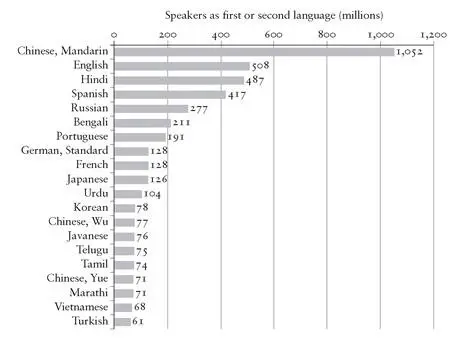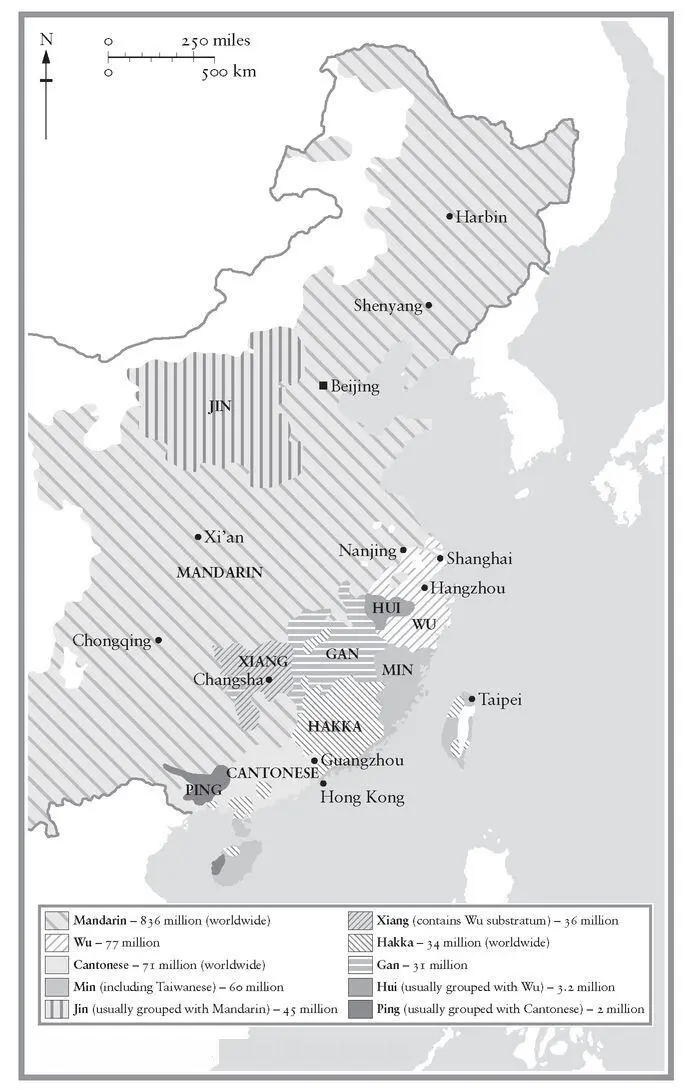East Asia is home to almost half the top twenty most widely spoken languages in the world today. Unlike the European languages, which were essentially spread by overseas conquest (the reason why the number of English, Spanish or Portuguese speakers now greatly exceeds the population of the countries they originated from), East Asian languages have grown organically in their densely populated, rice-growing homelands, as a result of demographic trends and/or land-based territorial expansion. They are spoken overseas overwhelmingly as a result of migration and consequently only on a relatively small scale. Mandarin is the most widely spoken language in the world, far exceeding English, but the vast majority of Mandarin speakers live in China; English, by contrast, has flown the nest.

Figure 9. The world’s top twenty languages.
The spread of English since 1945, driven by the global pre-eminence of the United States, has not affected the popularity of the main East Asian languages in their homelands. Not only has English failed to weaken or displace the main North-East Asian languages (Mandarin, Japanese and Korean), the languages themselves have also been relatively little touched by it. Japanese, it is true, has acquired many English loanwords, mainly nouns, but this reflects the typically Japanese way of adding foreign elements to their culture while leaving the Japanese core fundamentally untouched and unaffected. [339] [339] James Stanlaw, ‘English in Japanese Communicative Strategies’, in Braj B. Kachru, ed., The Other Tongue: English Across Cultures (Urbana: University of Illinois Press, 1992), pp. 181-4. It has been estimated that 8 per cent of the total Japanese vocabulary is derived from English, with virtually no reverse traffic; ibid., p. 183. Also Braj B. Kachru, Asian Englishes: Beyond the Canon (Hong Kong: Hong Kong University Press, 2005), p. 81.
It is fashionable in Japan — as elsewhere in the region — to wear T-shirts bearing an English phrase, or to have shops with English names, or to see advertising with English slogans, but this has no bearing on the extent to which the Japanese speak, or even desire to speak, English. Despite an enormous cohort of English teachers and many years of compulsory English at school, the vast majority of Japanese are unable to speak English with either enthusiasm or facility. [340] [340] Kachru, Asian Englishes , pp. 191- 2. A survey in 1998 found that 81.7 per cent of Japanese only speak Japanese even though virtually no one else speaks their language; Dentsu Institute for Human Studies, Life in the Era of Globalisation: Uncertain Germans and Japanese Versus Confident Americans and British, the Second Comparative Analysis of Global Values (Tokyo: July 1998). Also, Kachru, Asian Englishes , Chapter 4.
Like the English, they remain linguistically insular and unembarrassed by the fact. The Chinese, on the other hand, have become hugely enthusiastic learners of English during the last decade or so and many young educated Chinese speak the language with impressive fluency. One teacher has taken to conducting his classes in huge stadiums with over 20,000 all chanting English phrases in unison. But this Chinese enthusiasm for English in no way reflects a decline in the popularity of Chinese. On the contrary, English remains a strictly second language, acquired for the purpose of conversing with foreigners, an interlocutor language for the young, well-educated and ambitious urban elite. Chinese, unlike Japanese, possesses relatively few English loanwords — or indeed loanwords from any language — and relatively little external structural influence. It has been influenced by the rise of English, for example, in the greater use of polysyllabic words, but only in a limited way: [341] [341] Chin-Chuan Cheng, ‘Chinese Varieties of English’, in Kachru, ed., The Other Tongue , p. 166.
a proposal, several decades ago, to romanize Chinese by replacing characters with Pinyin transliteration came to nothing. [342] [342] Ostler, Empires of the Word , pp. 146, 155.

Map 8. The Main Chinese Languages
We should not be surprised by the continuing strength and resilience of Chinese. It is a language that dates back over three thousand years. Its pictographic writing system is shared by all the various Chinese — or Sinitic — languages, including Mandarin, Cantonese, Wu and Min: over 70 per cent of Chinese, well over 800 million people, speak just one of those languages, namely Mandarin, a figure which includes various dialects like Shanghainese, and the number is steadily rising as a result of the growing influence of television and the education system. [343] [343] Ibid., pp. 116-17.
The fact that all Chinese languages and dialects share the same written script, even though they are often unintelligible to each other as spoken (being comparable in their diversity to the Romance languages), has been extremely important in maintaining a wider sense of Chinese identity. Chinese managed to survive long periods of foreign occupation by the Mongols and Manchus. Although both spoke different languages, they not only failed to impose them on the Chinese, but ended up being linguistically assimilated themselves. The influence of Chinese on the neighbouring but different languages of Japanese, Korean and Vietnamese has been immense. Each originally developed writing systems for their own languages by transforming or adding Chinese characters — known as hanja and kanji in the Korean and Japanese writing systems respectively. Even though these languages are quite different in linguistic structure from Chinese, such was the prestige of ancient Chinese scholarship that, over time, they became replete with Chinese vocabulary and have remained so ever since. Those who speak Chinese often refer to it as zhongguohuo , or ‘centre realm speech’: Sino-centrism, or what I will describe later as the Middle Kingdom mentality, even extends to how the Chinese perceive their language. Chinese has even managed to survive the onslaught of the alphabetic age, though in reality, of course, it would be well-nigh impossible to create an alphabetic language which could act as the writing system of so many different Chinese languages and a fifth of the world’s population. [344] [344] Ibid., pp. 117, 144, 156-7, 162.
The only East Asian countries in which English has acquired a central role are Hong Kong and Singapore, where it is an official language; Malaysia, where it is very widely spoken although the official language is Bahasa Malaysia; and the Philippines, where English is still an official language alongside Tagalog. Apart from the Philippines, which was an American colony, these are all former British colonies. The popularity of English in Singapore and Malaysia owes much to the fact that English — as in India — has acted as a useful common language in a highly multiracial and multilingual environment. In the Philippines, English is used as a language of instruction in schools (from the age of twelve) in what is a complex linguistic archipelago, with Tagalog coexisting with many island dialects. The main language of Indonesia — a patchwork quilt of hundreds of languages — is Bahasa Indonesia, with the old colonial language, Dutch, now insignificant. Similarly, in Vietnam, Cambodia and Laos, all former French colonies, French, once the official language in administration and education, has long since faded into relative obscurity.
Читать дальше














